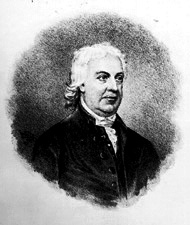Samuel Livermore
| Samuel Livermore | |
|---|---|
 |
|
| 6th and 13th President pro tempore of the United States Senate | |
|
In office December 2, 1799 – December 29, 1799 |
|
| Preceded by | James Ross |
| Succeeded by | Uriah Tracy |
|
In office May 6, 1796 – December 4, 1796 |
|
| Preceded by | Henry Tazewell |
| Succeeded by | William Bingham |
|
United States Senator from New Hampshire |
|
|
In office March 4, 1793 – June 12, 1801 |
|
| Preceded by | Paine Wingate |
| Succeeded by | Simeon Olcott |
| Member of the U.S. House of Representatives from New Hampshire's 3rd at-large congressional district | |
|
In office March 4, 1789 – March 3, 1793 |
|
| Preceded by | Office established |
| Succeeded by | John Samuel Sherburne |
| Personal details | |
| Born |
May 14, 1732 Waltham, Massachusetts Bay |
| Died | May 18, 1803 (aged 71) Holderness, New Hampshire |
| Political party | Pro-Administration Federalist |
| Alma mater | College of New Jersey |
| Profession | Law |
Samuel Livermore (May 14, 1732 – May 18, 1803) was a U.S. politician. He was a U.S. Senator from New Hampshire from 1793 to 1801 and served as President pro tempore of the United States Senate in 1796 and again in 1799.
Livermore was born in Waltham, Massachusetts, and attended Waltham schools. He graduated from the College of New Jersey (now Princeton University) in 1752, He then studied law, was admitted to the bar in 1756, and commenced practice in Waltham. He moved to Portsmouth, New Hampshire, in 1758 and later to Londonderry. He was a member of the New Hampshire General Court (the state's general assembly) 1768-1769. He was judge-advocate in the Admiralty court and Attorney General from 1769 to 1774. He moved to Holderness in 1775 and was State attorney for three years.
Livermore was a Member of the Continental Congress from 1780 to 1782 and again from 1785 to 1786. He was Chief Justice of the New Hampshire Superior Court of Judicature from 1782 to 1789, and a member of the State constitutional convention in 1788. He was elected to the United States House of Representatives for the First and Second Congresses, serving from March 4, 1789 to March 4, 1793. He was chairman of the House Committee on Elections in the Second Congress.
...
Wikipedia
